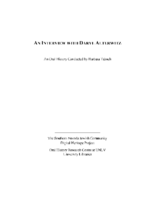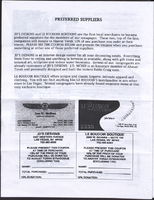Search the Special Collections and Archives Portal
Search Results

Felipé Goodan interview, April 1, 2019: transcript
Date
Archival Collection
Description
Interviewed by Monserrath Hernández. Rabbi at Temple Beth Sholom since 1998, Felipe Goodman is a native of Mexico City. He identifies as a Mexican Jewish American, and shares the complexities of these.
Text
Congregation Pânai Tikvah
Congregation P’nai Tikvah, formerly known as Valley Outreach Synagogue, is the only congregation in Nevada affiliated with the Reconstruction and Renewal movements of Judaism. Located in Las Vegas, Valley Outreach Synagogue was founded by Rabbi Richard Schachet in 1993. In 2005 he retired and Rabbi Yocheved Mintz became spiritual leader of the congregation. Reconstructionism views Judaism not just as a religion, but as an entire culture, which evolves over time and continues to be shaped by tradition.
Corporate Body

Mara Braun interview, September 9, 2019: transcript
Date
Archival Collection
Description
Interviewed by Barbara Tabach. Mara Braun, a native of Puerto Rico, has lived in Las Vegas since 1975. She is the owner/operator of a successful event and catering business. Mara married Abe Braun and raised their children in both Latinx and Jewish traditions.
Text

Transcript of interview with Daryl Alterwitz by Barbara Tabach, November 8, 2014
Date
Archival Collection
Description
Interview transcript with Daryl Alterwitz by Barbara Tabach on November 8, 2014. In this interview Daryl Alterwitz, son of Deanne and Oscar Alterwitz, recalls moving to Las Vegas from Gary, Indiana, for his parents' pursuits in the furniture business. He speaks about his schooling at Valley High School, his friendship with Robert Engel, and attending University of California Santa Cruz, and taking a leave of absence to travel through Asia. Alterwitz became more involved in Judaism after his bar mitzvah, and has continued his religious affiliation throughout his adult life, and has traveled to Israel twice. He talks about meeting his former wife, his travels through Europe, and coming back to Las Vegas after some time in Reno.
In 1959, Daryl Alterwitz was born in Gary, Indiana, son of Oscar and Deanne Alterwitz. When he was thirteen years old, his family moved to Las Vegas to capitalize on new opportunities in the growing city, and his parents purchased Walker Furniture soon after their arrival. As a high school student, Daryl experienced a powerful trip to Israel, which strengthened his connection to Judaism. After graduation from Valley High School, Daryl attended the University of California - Santa Cruz, and after two years of study, Daryl took time off to travel throughout South Asia, accompanied by close childhood friend Robert Engel. He returned after a year and graduated with an independent major in classical studies. From there, Daryl spent more time in Israel living on a kibbutz. Daryl next went to law school at Santa Clara University, and then supplemented his education with a degree in taxation from New York University School of Law. Between law school and New York, he met his wife, Teri Shoofey; they two had two children, though are now divorced. After New York, he returned to Nevada, first living in Reno. After his father passed away, Daryl moved back to Las Vegas, and took on more responsibility with the family business as well as practicing law. Daryl?s commitment to community service is enduring and visible. He has donated his time and resources to both Jewish organizations, like Jewish Family Services, and non-Jewish groups, like Las Vegas Rescue Mission. He has also served on the boards of the Jewish Federation, Congregation Ner Tamid, and the Anti-Defamation League. Daryl also continues to indulge his passion for international travel, having visited Morocco, Egypt, Turkey, Cambodia, and has even biked from Hungary to Poland.
Text

Transcript of interview with Georgia Adras by Robin L. Hayes, March 02, 1977
Date
Archival Collection
Description
Text



